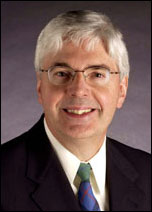New master's program at Anschutz first of its kind in region
Research-focused epidemiology degree addresses need in public health sector
A new degree program at the University of Colorado Anschutz Medical Campus will address the shortage of workers trained in epidemiology, a core public health discipline that's in demand more than ever.
The master of science in epidemiology will be offered at the Colorado School of Public Health (CSPH), a collaborative project of the University of Colorado Denver, Colorado State University and the University of Northern Colorado. Epidemiology studies the cause, spread and control of threats to public health.

Photo courtesy of University of Colorado Denver |
| Nairn |
"It will be the only degree of its kind in the Rocky Mountain region," said UC Denver Provost Roderick Nairn. "With such concerns as H1N1 and bioterrorism, there's been a lot more interest in public health, and our public health workers are depleted. We need more people, and they need advanced degrees."
Nairn presented the recommendation for the research-focused degree program to the Board of Regents at the Oct. 16 meeting. After receiving board approval, the request now goes to the Colorado Department of Higher Education for consideration. The program would begin in the fall of 2010, a required deadline for the CSPH to remain on track for accreditation next year by the Council on Education in Public Health. Student applications for the first semester are due in February.
"The purpose of this degree program is to give students a foundation in the science and methods of research in epidemiology so we can move knowledge in the field forward, rather than just relying on existing paradigms," said John Hokanson, Ph.D., associate professor and chair of the Department of Epidemiology at CSPH.
Hokanson said he expects the program to attract students interested in careers in population-based research at universities or in industry, such as biotech or pharmaceutical companies. "This would be an ideal degree," he said.
In a statement provided to the regents, UC Denver Chancellor M. Roy Wilson said plans for the new degree program make smart use of existing resources, with no need for new course development. The three to five new students expected to enroll per year in the degree program's first five years will take existing classes.
"We've targeted a relatively low number of students so that we don't get caught short," Hokanson said. "We certainly could handle more, probably double that number, if there's interest. Probably the biggest resource demand will be for faculty. The master's requirement is either a thesis or published paper, and those require a fair amount of faculty time to guide a student."
Hokanson said high demand might mean some students who apply for the program are turned away to start.
"I would hate to do that, but I don't want to overload the resources in our department," he said. "I certainly expect the program to grow, and my hope is that it grows in a continuous, limited way rather than a precipitous way."

|